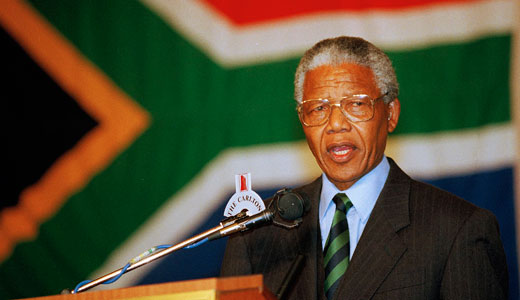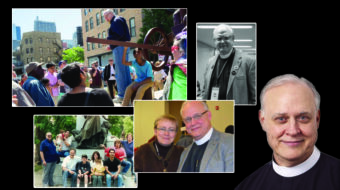
The world celebrates the life of Nelson Mandela and reveres him for one thing more than any other – his determination in the face of every provocation to establish a democratic “rainbow nation” where all people, white and black, were equal citizens. Because of his amazing feat of reconciliation with his former jailers and the brutal oppressors of his people, South Africa avoided a terrible civil war and is a beacon of hope for the entire world. But how did Mandela achieve this, how did he overcome the temptation and strong pressure to exact revenge? The answer is given in a remarkable article in the Dec. 8 New York Times by the highly respected journalist, Bill Keller. Entitled “Nelson Mandela, Communist,” it analyzes the long and close alliance of the African National Congress with the South African Communist Party.
“Perhaps the most important and lasting personal effect of the South African Communist Party on Mandela,” Keller writes, “was that it made him or helped make him a committed nonracialist. The ANC in its formative years admitted only blacks. For a long time the Communist Party was the only partner in the movement that included whites, Indians and mixed race members. That relationship was one of the main reasons Mandela cited for his rejection of black nationalism and his insistence that multiracialism remain at the heart of the ANC ethic.”
The article also points out that after the overthrow of apartheid, when the ANC held a parliamentary majority, it was the SACP that “was the most ardent advocate of sharing power with the white regime” and resisted those who demanded immediate nationalization of the mines and other industries and other measures of retribution contained in the South African Freedom Charter.
Quoting British historian Stephen Ellis, the article states,” Today, the ANC officially claims still to be at the first stage … of a two-stage revolution. This is a theory obtained directly from Soviet thinking.” The official line in the our mass media is that while the U.S. sided with the apartheid regime for Cold War reasons, Mandela is now acceptable and can be honored because he allegedly changed while in prison and moved away from revolutionary forces in the ANC. The truth is the exact opposite. When the apartheid regime offered to release him if he would renounce violence and break ties with the SACP, Mandela, recognizing that this would shatter the ANC, displayed extraordinary moral courage and refused. As Mandela himself insisted, he never stopped being a revolutionary. It’s just that revolutionary theory is far more subtle and sophisticated than the media is willing to recognize. When it comes to communism, the media prefers crude stereotypes.
All revolutions go through stages, including the revolution that established capitalism in our country. The first anti-colonial stage was led by George Washington, but the completion, the second stage, required elimination of slavery, and was led by Abraham Lincoln. Many of the northern leaders of the first stage, including Franklin, Paine and John Adams, opposed slavery, but the necessary political coalition – broadly based and black and white – to abolish slavery would not materialize for another 70 years.
Today we in the U.S. face the challenge of defeating right-wing extremism. There are some who would like to skip this stage and put attacking President Obama and the Democrats on an equal footing. This tactic is both divisive and counter-productive. If labor and its allies do not yet have the strength to defeat the extremist section of corporate power how can they hope to defeat corporate power altogether? The extremists are growing more isolated and the progressive forces are gaining strength but the support of the Democratic parts of the ruling class is still very much needed. The newly formed Wall Street-based “Third Way” group could be an effort to split the Obama coalition. To prevent this and win at this stage we need to emulate the steadfastness and political maturity shown by Mandela and the South African Communist Party.
Photo: Newly elected President Nelson Mandela delivers his victory speech against a backdrop of the new South African flag, at a hotel in downtown Johannesburg, May 2, 1994. AP/David Brauchli

MOST POPULAR TODAY

High Court essentially bans demonstrations, freedom of assembly in Deep South

Zionist organizations leading campaign to stop ceasefire resolutions in D.C. area


U.S. imperialism’s ‘ironclad’ support for Israel increases fascist danger at home

UN warns that Israel is still blocking humanitarian aid to Gaza






Comments